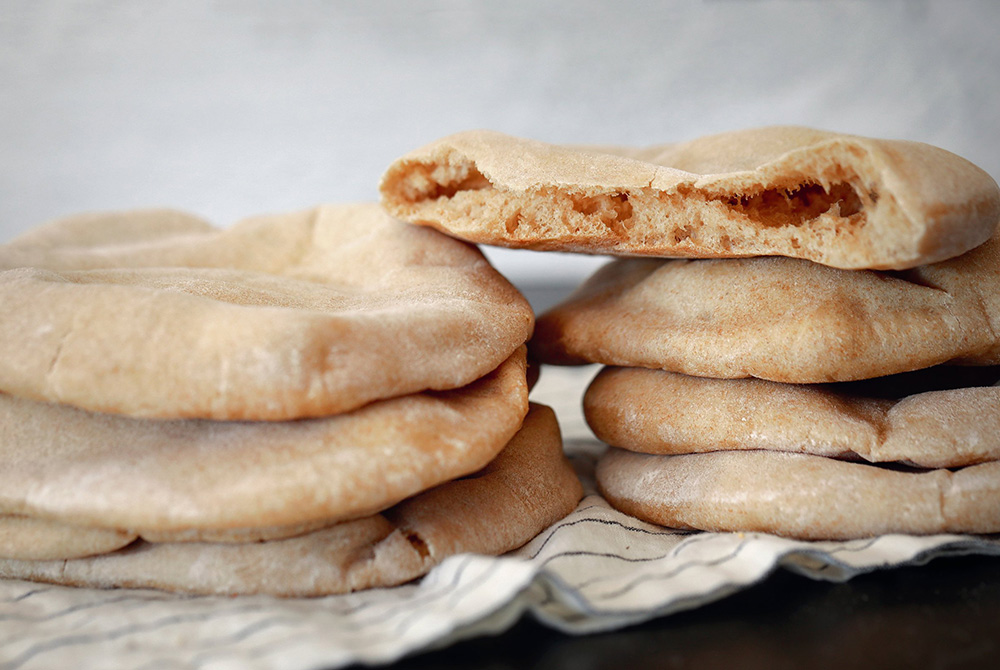
A leavened flatbread akin to pita has been made in the Middle East since before the time of Christ. (CNS/Nancy Wiechec)
Fairy tales can illustrate our best or most tragic potential. Think of King Midas whose love of gold destroyed everything that was worth loving in his life. When big people read the Midas story to little ones, the folklorist's purpose comes to fulfillment. The grownups have to answer the children's questions about the story, take responsibility for the tale's teaching, and then behave accordingly. The report about the grouchy Israelites in the desert and the back-and-forth between Jesus and the crowds of today's Gospel have a fairy tale's power to lead us toward a deeper appreciation of God's presence in our life and in all of history.
When we think of Moses, we might imagine Michelangelo's colossal statue depicting the great lawgiver powerfully poised on a judgment seat, holding the stone tablets inscribed with God's rules for life. But when we take the perspective of today's selection from Exodus, we encounter Moses resembling a beleaguered nanny contracted by God to watch over, lead, and form an unruly, often obstinate populace into living freely as God's own people. Like Midas, the people of God wandering in the desert kept choosing lesser goals. That evoked Moses' wrath — a fury that flowed from his love for them and his intractable faith that God was calling them out of futility into something wonderful.
The story we hear today epitomizes Moses' wearisome task. After the escaped slaves had been in the desert for a while, they feared that they would die of thirst, so God led them to a place with abundant springs. Then, after about 45 days on the road, they began reminiscing about what they used to eat when they were slaves. They remembered the old menus with a relish they had probably never felt while dining in Egypt. Adding to their superb demonstration of complaining as high art, they spread the rumor that Moses had brought them there just to watch them die. God, refusing to allow their fickleness to undermine the divine project, assured Moses that the situation was in hand. Every evening, flocks of birds would be theirs for the taking and every morning, they would have the makings of bread. And so it was.
When we attend to the details, the people's immediate unenthusiastic reaction is pretty understandable. In the morning, just where the birds had been the night before, people discovered "fine flakes" covering the ground. The Israelites quite naturally asked, "What is it?" or, in their language, "Man hu?" an expression which evolved into the name, manna. Someone, most likely some of the women, figured out that the flakes could be gathered and prepared such that they would indeed serve as bread. Eventually, reflection on that experience led the people to the conviction that their God would always provide for them. Memory transformed the unfamiliar bread into the never-to-be-forgotten manna, a sign of God's enduring love.
John's Gospel brings the past into his present, showing the fulfillment of the desert story in Jesus. Last week, we heard that in Jesus' presence and with his blessing, thousands of hungry people ate their fill. Then, rather than let them turn the event into a circus, Jesus snuck away. Today we hear what happened when the crowd found him back in Capernaum where they could buy or bake their own bread.
Advertisement
At home with them, Jesus led the people to questions about the quality of their lives. In the desert, their hungry ancestors had encountered the love of God. Would they be content with the sustenance they could find at the bakery or did they long for more? When Jesus offered "true bread," they responded, "Give us this bread always." His answer, "I am the living bread," was not what they were looking for. Instead of promising a free lunch, Jesus was inviting them to be nourished by his life, to assume his way of being as the path that would bring them everything they could ever want.
The miraculous sharing of bread that had happened among them offered the key to understanding Jesus' offer. When one child gave all he had, they saw that those who share everything will never hunger. If they wanted to do the works of God, if they wanted the food that endures, they needed only to believe in Jesus enough to do what he did.
Jesus' sharing of himself as the bread of life illustrates the greatest potential of human life. The Son of God entered our history not to wow us with miracles, but to show us how we can live as Paul suggests: as new selves, people truly renewed in spirit. We who love the stories of Jesus can and must take responsibility for them by making them come true in our own day.
[St. Joseph Sr. Mary M. McGlone serves on the congregational leadership team of the Sisters of St. Joseph of Carondelet.]
